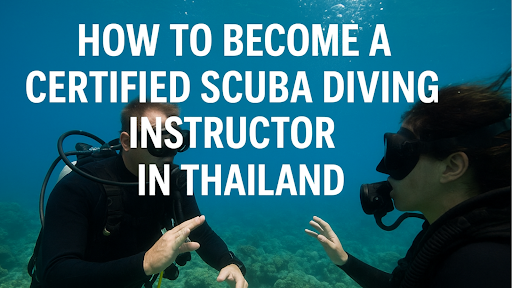Imagine not having to sit in an office chair for 8 to 9 hours a day, and your workplace is a beautiful diving site that can be located anywhere in the world. This is the compelling, adventurous reality of a scuba diving instructor. If you have a passion for the ocean, becoming a diving instructor opens global opportunities.
However, it demands excellence in training and a focus on professional versatility. This article offers a strategic perspective of the path ahead. Let’s learn how to become a certified diving instructor in Thailand.
Prerequisites
You need to master your own skills first, to instruct others safely. Check the diving instructor prerequisites table to learn about the non-negotiable requirements you must meet.
| Age | At least 18 years old |
| Medical Fitness | Must be medically fit to dive |
| First Aid/CPR | Must have valid certification (usually within the last 24 months) |
| Prior Certification | Must hold certifications up to the Divemaster level and Deep and Nitrox specialty |
| Logged Dives | 100 logged dives |
The Instructor Development Program (IDP) can cost you around 65,000 ฿.
The Divemaster Course
The Divemaster certification is the first professional step to transition from a diver to someone who can supervise dive activities and assist with student training. Typically, it takes around 2 months to complete the Divemaster course before progressing toward instructor certification. The Divemaster course at the best diving school in Koh Tao covers:
- Theory Lessons
- Pool Sessions
- Ocean Diving
Prerequisites
| Age | At least 18 years old |
| Prior Certification |
|
| Specialty Diving | Must complete Deep 40 and Nitrox specialties before certification |
| Medical Fitness | Must be medically fit to dive |
The Divemaster diving course in Koh Tao, Thailand, typically costs around 40,000 ฿.
The Instructor Training Course (ITC)
Once you are a certified Divemaster, the next step is the Instructor Training Course (ITC). It is a comprehensive program that prepares you to teach and evaluate students. Find a good school offering the SSI Instructor course package.
Prefer a crossover to RAID, as this certifies you with two of the most internationally recognised bodies. Both SSI and RAID not only demonstrate versatility but also broaden your global employment potential.
What a Comprehensive Instructor Package Should Include
Join a Koh Tao diving school offering an all-inclusive training package that focuses on high-demand specialities.
| Training Versatility | SSI/RAID education material and theory lessons |
| Practical Experience |
|
| Advanced Expertise | Deep & Nitrox Instructor Certifications |
| Logistics and Fees | Certification and Membership fees included |
| Safety | Fully comprehensive diving insurance |
Tips for Becoming a Successful Diving Instructor in Thailand
Choose a Reputable Dive School
Not all dive schools offer the same quality of training. IBDiving Koh Tao , for example, offers comprehensive SSI/RAID courses. Ensure the dive school has experienced instructors, a strong safety record, and positive student feedback.
Gain Real Diving Experience Before Training Others
While the certification shows that you have the required skills and knowledge to become an instructor, you should still log as many dives as possible in different conditions, such as:
- Night dives
- Deep dives
- Drift dives
This not only boosts your confidence but also gives you real-world experience to draw on when teaching future students.
Network Within the Diving Community
There are over 150+ dive sites in Thailand, making it a global diving hub. You get unparalleled opportunities to build professional connections with dive centres, instructors, and tourism operators. Networking can lead to job opportunities or partnerships worldwide.
Stay Physically and Mentally Fit
This physically demanding job requires you to maintain stamina and prevent fatigue. Therefore, regular swimming, strength training, and flexibility exercises are essential. Also, practice mindfulness to stay calm and focused.
Keep Expanding Your Skillset
Don’t stop learning after certification. Keep on adding new specialities to your CV, such as:
- Wreck diving
- Photography
- Underwater navigation
Embrace the Lifestyle
Embrace an ocean-centred lifestyle. Respect marine ecosystems, follow and support sustainable diving practices such as:
- Using reef-safe sunscreen
- Avoiding contact with marine life
- Maintaining proper buoyancy
- Not feeding or chasing marine life
- Avoiding single-use plastics
- Educating students about marine protection
- Participating in reef clean-ups or local conservation initiatives
Your journey towards a successful career as a diving instructor begins with the right diving school. Ensure you select one offering certified courses and comprehensive packages.
Take the plunge — your classroom could soon be the coral reefs of Thailand.

